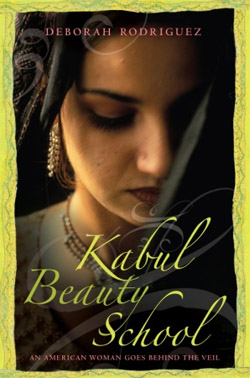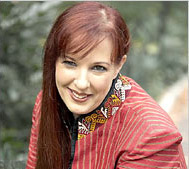Feb 22, 2026
Feb 22, 2026
In her recent book, 'Kabul Beauty School ', Debbie documents how she arrived in Afghanistan to work with an aid group - mostly comprising doctors, nurses and therapists - but soon realized that she was of little help to them. "She must be married. She does her eyebrows," said my Afghan friend Safia. Despite having grown up in the US, Safia is aware of the entire regimen of codes that govern the social behavior of Afghan women. For example, eyebrows indicate the marital status. Plucked eyebrows indicate marriage. If, by chance, an unmarried woman has plucked eyebrows, it is a suggestion that either she or her family is not very strict about 'morality'.
"She must be married. She does her eyebrows," said my Afghan friend Safia. Despite having grown up in the US, Safia is aware of the entire regimen of codes that govern the social behavior of Afghan women. For example, eyebrows indicate the marital status. Plucked eyebrows indicate marriage. If, by chance, an unmarried woman has plucked eyebrows, it is a suggestion that either she or her family is not very strict about 'morality'.
So, when Deborah Rodriguez stepped into this intricate world governed by thousands of minutiae, it was a little like a bull in a China shop. Loud, brazen and colorful, Rodriguez (Debbie, to everyone in Kabul), a hairdresser from Michigan, USA, came to post-Taliban Afghanistan as part of a group offering humanitarian aid to the war-torn nation. Running away from a bad marriage, she was looking for something more fulfilling to do in life.
However, she found her calling in a most unique service. In post-Taliban Afghanistan, the international community is not quite wearing jackboots and camouflage fatigues. Most are well-paid internationals, desperate for some beauty care. Debbie immediately saw potential in that.
 One to mix around easily with locals as well, Debbie discovered that until the Taliban came to power, Afghan women used to run their own beauty salons. An idea dawned on her. She realized that upgrading the skills of Afghan beauticians, forced underground during the Taliban ban on beauty salons, would be a way of contributing and helping destitute women. As she began collecting money and supplies for the school, she says, she realized another group of women had the same idea at the same time and she decided to join them. Thus was born the Kabul Beauty School.
One to mix around easily with locals as well, Debbie discovered that until the Taliban came to power, Afghan women used to run their own beauty salons. An idea dawned on her. She realized that upgrading the skills of Afghan beauticians, forced underground during the Taliban ban on beauty salons, would be a way of contributing and helping destitute women. As she began collecting money and supplies for the school, she says, she realized another group of women had the same idea at the same time and she decided to join them. Thus was born the Kabul Beauty School.
But, this is where Debbie's account begins to deviate from what other women involved in Kabul 's first beauty school have to say. Most have expressed their displeasure at Debbie not giving them their due. But Debbie and her co-author, Kristin Ohlson, deny that she has taken sole credit for the idea and the work.
However, in the book, apart from acknowledging the contribution of Mary Meakin - who has stayed and worked in Afghanistan for over 50 years - Debbie chooses to blank out all others. No one else seems to exist in this story of courage, struggle and hope - except for Debbie and the women she is helping.
Most reviewers, when they have not been gasping in awe at her work in Afghanistan, have chosen to document the claims and counter-claims of the contending sides. Certainly, the importance of factual narrative in an autobiography is essential. However, the book would have been equally fascinating as a work of fiction.
While Debbie's flamboyant personality and marriage to a former commander (who worked for northern Afghan warlord Rasheed Dostum), make the book an easy-sell on talk shows, its appeal actually lies completely outside the how-I-married-an-Afghan-'mujahid'-and-saved-Afghan-women routine.
What is fascinating about the book is the wealth of detail, the colors, patterns, dialogues and gestures that document Debbie's odyssey through Kabul. Though tomes have been written analyzing post-conflict Afghanistan, Debbie's narrative brings alive the tapestry of lives, especially of women in post-conflict Kabul, almost without a self-awareness of the documentation.
Through the almost surreally-dizzy world of beauty salons, we see lives unfolding. Whether it is the problem of running hair dryers without electricity or the description of markets lined with butcher's stalls with headless carcasses or the harassment of women on the street, Debbie brings to life the sights and smells of the city.
Similar is the way her layers of documentation reveal the lives of ordinary women in Kabul: beauticians desperate to join the beauty school and earn a living; or the girl at the salon who tries to get her co-wife to push her husband to divorce so she can be free of an oppressive marriage; or the young girl who has to prove she is a virgin on the night of her marriage even though she is not.
At another level, Debbie provides a parallel to the lives of her girls at the beauty parlor. Trapped in an abusive marriage, Debbie tried to cope by "getting religion". Yet, she found little comfort in her spiritual leaders, who could not support her decision for divorce (as her husband had not committed adultery). Not too different from Afghan women, who are told to maintain their marriage despite all odds.
Once in Afghanistan, Debbie's friends decided that she needed 'a husband', discussing a prospective partnership as if "offering me another egg roll". Despite her initial surprise, she did accept the egg roll, a mere 20 days after meeting with Samer Mohammed Abdul Khan or Sher, a henchman of Dostum. Debbie speaks frankly of language difficulties and cultural barriers. Her husband has another wife and seven daughters in Saudi Arabia and even though she was angry and unhappy when she found out, she accepted them.
Despite this apparent frankness, it is clear from the book that Debbie has revealed as much as she has hidden, turning up only a small sliver of her life for inspection. How does she deal with marriage to a man she had known for less than a month and who speaks scant English? Why did she sideline all her co- workers at the salon in the book? What about her problems with the Ministry of Women's Affairs, which virtually shut down her salon/beauty school on the grounds that she was running a for-profit business? (Debbie herself acknowledges settling a tax demand through a large pay-off.)
Unfortunately, these questions must wait: Debbie, a frequent fixture at the Kabul Coffee House, which she owns, has left the country. It is said she may not return and that the book may have forced her to leave the country, of which she wrote in the closing sentences of her book: "As soon as I set my foot on this soil, I knew I'd somehow managed to come home."
('Kabul Beauty School: An American Woman Goes Behind the Veil' by Deborah Rodriguez, co-written with Kristin Ohlson. Published by Random House. Price Rs.700/US $17.5)
17-Jun-2007
More by : Aunohita Mojumdar